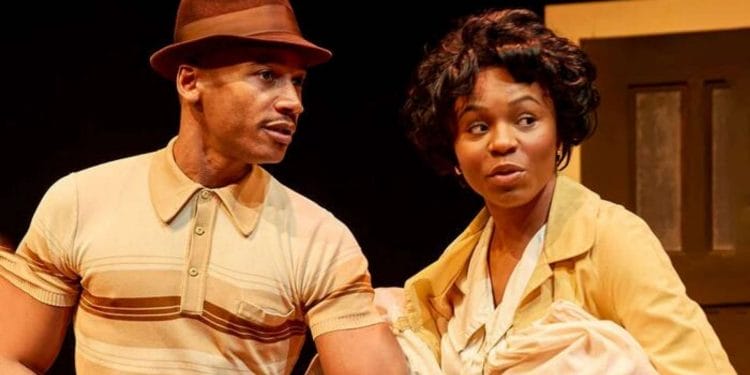Have you ever been with a group of people and suddenly conflict has sprung up between them? Maybe two people start arguing and then someone else makes a stupid comment and suddenly everyone is fighting. You’re sat there, feeling wildly uncomfortable, kind of hoping to escape, and fighting the urge to burst into nervous laughter. That’s exactly how it feels to watch Clybourne Park at Park Theatre, directed by Oliver Kaderbhai. This is not a bad thing, good theatre immerses you in the action and draws out emotions from you that perhaps you hadn’t expected to experience.
In 1959, homeowners Bev and Russ are moving away from the area in an attempt to get over a tragedy in the family. Neither of them is dealing with it very well, Bev is highly strung, Russ is angry, and it’s affecting the people around them. Things come to a head when it’s discovered their house has been sold to a black family, the first in a white neighbourhood. Thus, ugliness and racism seep into the group’s dynamic, a trickle that becomes a bursting damn of vitriol and bigotry. Fifty years in the future the same house, now part of a predominantly black neighbourhood, has just been bought by a white couple, and it seems as if history is repeating itself.
The entire cast of Clybourne Park was a delight to watch, however, it is Aliyah Odoffin as Francine/Lena who quietly sits at the centre of our attention. Her character is perhaps the most unassuming of the group, but her presence is strong, every micro-expression holding an infinity of meaning. Imogen Stubbs, specifically as Bev, was also particularly heartbreaking to watch. Meanwhile, Andrew Langtree was skilfully hateful as the so-called villain of the piece, (although many of the characters showed their ugly side), but Langtree’s character was all too familiar, unfortunately, both as Karl in the 50s and Steve in the 00s.
The lighting and standing are simple but effective, however, it is the choreography that really makes the play work. With multiple conversations happening at the same time, the directed movement skilfully directs the audience’s attention to the pertinent parts of the dialogue. It’s carefully constructed chaos, a well-oiled machine of mayhem.
Clybourne Park, while certainly a comedy, is at times an incredibly uncomfortable piece of theatre to watch. You find yourself laughing and then wondering if you should. It’s very well done and certainly, media that explores topics of racism and bigotry should make you feel uncomfortable. However it is important to note that Bruce Norris, the writer, is a white man, and much like the characters in the play, the audience is left to consider the spaces we all hold in the ever-important discussion of race. Ultimately it’s down to the individual viewer what they take away from the experience.

















